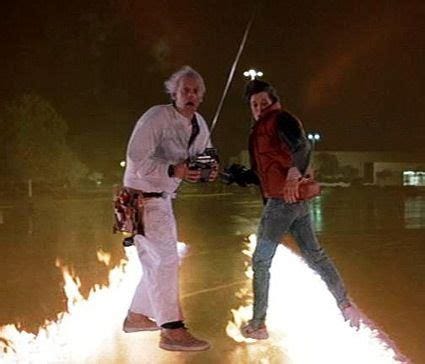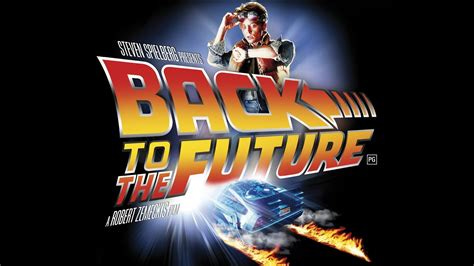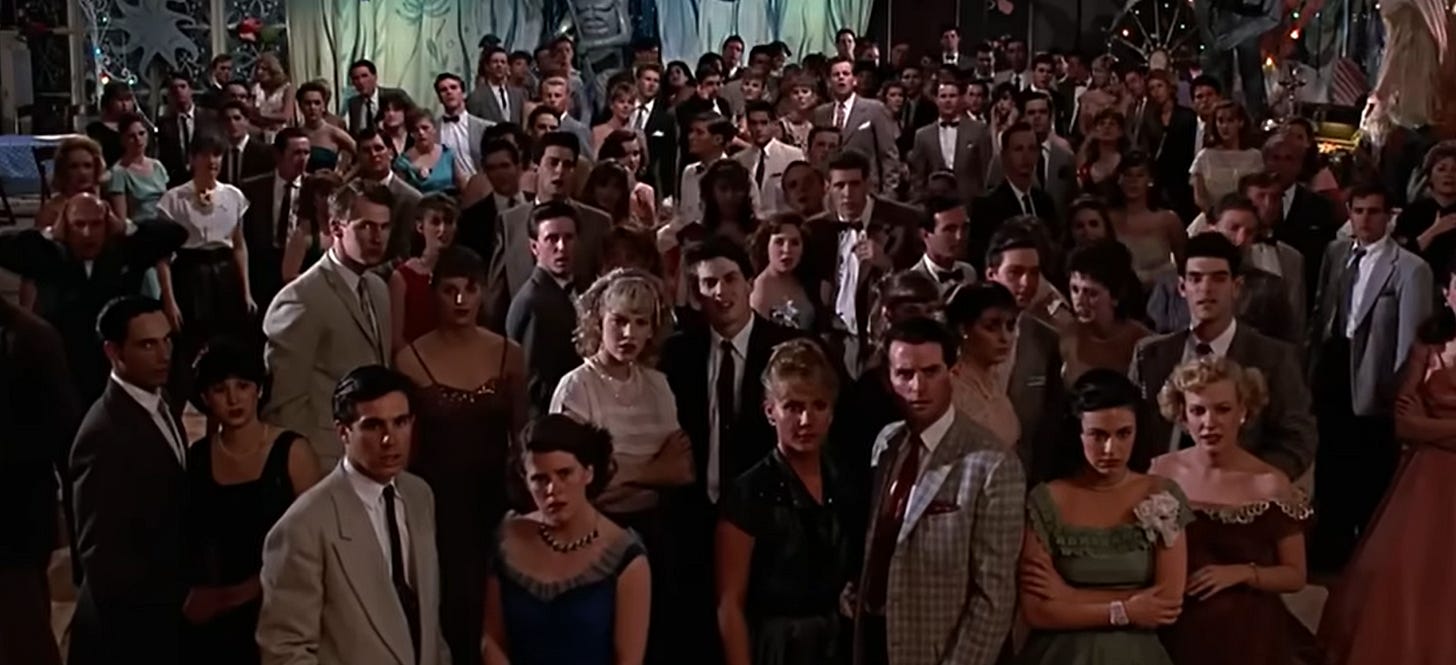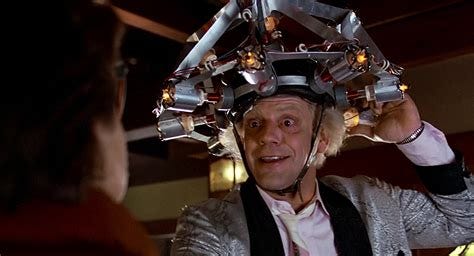I Hate Many Things About BACK TO THE FUTURE. It's Still a Great Movie.
It just goes to show that if you get some things *really* right, you can screw up a lot of the rest.
Here is a partial list of the things that annoy me about the 1985 movie Back to the Future:
It opens with that cheap, lazy sight gag about a massive amp blowing Michael J. Fox across the room.
Michael J. Fox’s family doesn’t look anything like his family, or any real biological family, would look.
When Marty goes back in time, most of the major characters are played by actors who aren’t even remotely convincing as teenagers.
The movie tries way too hard to make Marty “cool” — with the skateboard, the guitar-playing, and the beautiful girlfriend. But Michael J. Fox is much better playing slightly desperate — the dork character, or at least someone dork-adjacent.
Crispin Glover’s performance is terrible, always completely out of sync with the other actors and incredibly distracting.
The lightning bolt strikes the clock at exactly 10:04 PM. Why not 10:04 and eighteen seconds? Because then Doc Brown’s plan would fail.
I’m also not crazy about the parts where the movie reveals that black people didn’t actually invent rock music or that a main character creepily watching a woman undress just makes him a lovable goof. But hey, times change.
Anyway, I could go on, but I think you get my point.
But ultimately, none of this matters. Back to the Future is still very obviously one of the greatest movies of all time.
The movie’s central concept is not just clever; it’s also somehow both extremely simple and thematically very rich.
A teenager goes back in time thirty years to when his parents were his age, only to accidentally disrupt their falling in love. Now he has to do two things: get his parents to somehow fall in love anyway so he and his future family members won’t cease to exist, and also get himself back to the future.
And while Back to the Future occasionally contains lazy writing, it also includes some genuinely fantastic material.
Many jokes are inspired, like when someone in the 50s sees Marty’s puffy down jacket and asks why he’s wearing a life preserver. And how Lorraine thinks Marty’s name is “Calvin Klein” because that’s what is prominently written on the waistband of his modern-day underwear.
This latter joke is doubly funny because it causes Marty to realize his own mother was sneaking a peek at his underwear — that she’s hot for him.
Then there’s that fantastic sequence at the Enchantment Under the Sea dance, where Marty goes on a screamin’ guitar solo that would be perfectly normal in 1985…
…only look up and see the utterly baffled 1955 crowd.
This is hilarious because, well, it’s hilarious, but also because it feels like exactly what would happen in this (bonkers) situation. It captures, yes, a profound truth.
There’s a lot of emotional truth in Back to the Future: how Marty’s mother portrays her own teen years compared to how they actually were. How Marty’s father acted when he was younger set him on a trajectory for his whole life — but that maybe that trajectory can be reversed.
Back to the Future also has some incredibly efficient storytelling. The movie repeatedly finds clever visual ways to establish the stakes and keep the story moving.
How does Marty know he has disrupted the future? Because his brother and sister are slowly fading from a photograph he carries. How does Marty know exactly when the clock tower will be struck by lightning? Because his girlfriend Jennifer wrote her number on the back of a flyer from the Save the Clock Tower Preservation Society, which Marty has taken with him into the past.
A lot of the so-called “plot holes” in the Back to the Future? They’re just people being overly picky about time travel stories, which are paradoxical and complicated almost by definition.
Look, there are parts of Back to the Future that I wish weren’t so lazy. Do we really need the distracting joke about Huey Lewis’ uptight school teacher snottily rejecting his own song?
At the same time, I also recognize these are just my opinions.
For what it’s worth, I have experience writing something that would go on to become a minor classic, and I can say with absolute certainty that when you’re working on something like that, you’re really not thinking about how hundreds of thousands of people will later experience it, some of them going through it with a fine-tooth comb, even writing judgy online essays about it.
You’re just doing the best you can, trying to get the project done on time while taking seriously the comments of the five or six people who read it in advance and took the time to give you serious notes.
Here’s my greater point: if you get the big things right on something you’re writing — if your concept is truly exceptional and you mostly pull it off — people won’t care if it’s not perfect. They’ll just see the great stuff and be really happy. Because honestly, true greatness is extremely rare.
And if you also get the emotional truth of your story right?
Well, hell. People might still talk about your project forty years after it comes out.
Brent Hartinger is a screenwriter and author. Check out his other newsletter about his travels at BrentAndMichaelAreGoingPlaces.com.






“You’re just doing the best you can, trying to get the project done on time while taking seriously the comments of the five or six people who read it in advance and took the time to give you serious notes.” - Gosh, I felt this!
My favorite line in that movie is when Marty is asked who is President in 1985. His answer, "Ronald Reagan," is met with an astonished: "The actor??!" Really shows how our perceptions of political leadership have changed over the years!